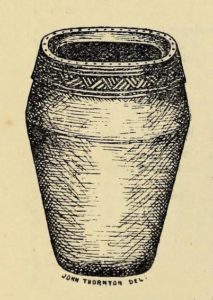Tumulus (destroyed): OS Grid Reference – SE 099 321
Archaeology & History

There are no longer any remains of the prehistoric burial site that once stood in one of the fields by Lower Headley Farm. We don’t know whether the site was a cairn, a tumulus, or just a stone-lined cist; but in all probability it would have been a low rounded hillock whose existence had long since fallen out of oral tradition. All that we do know is that in one of the fields by the farm, some very well preserved urns—either neolithic or Bronze Age by the look of it—were unearthed, indicating a site of prehistoric provenance.
The finds were described only briefly in the first edition of the Bradford Antiquary (1888) journal, where it was reported:
“During the spring of 1880 an interesting discovery was made by Mr. Abraham Craven, quarryman, of Thornton. The ‘find’ comprised three funeral urns, which Mr. Craven turned up while baring a portion of a field in Lower Headley Farm, the property of the trustees of Sowerby Grammar School. The discovery was made within a short distance of the surface, the pottery presenting undoubted indications of pre-Roman origin. From evidence collected upon the spot, and the appearance of the pottery, two of the urns were about 14in in height, 9in across the top, 11½in at the widest portion of the bowl, and 6in at the foot. One of the urns was of sun-burnt clay, with rude markings, the other having evidently been subjected to fire. No coins, personal ornaments, or other indications of civilisation, were found in the urns, but each one contained human dust and bones. From the fact that several other urns have been met with in the immediate vicinity, equally rude in type, evidence is not wanting that the picturesque mound upon which Headley is situate was inhabited at a very early period of British history.”
References:
- Anonymous, “Valuable ‘Find’ at Headley, near Thornton,” in Bradford Antiquary, volume 1, 1888.
© Paul Bennett, The Northern Antiquarian
The map could not be loaded. Please contact the site owner.